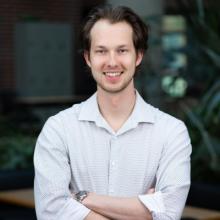Jordan Bird
Why did you decide to pursue a graduate degree?
The short answer is I find science interesting and rewarding. The long answer is that graduate degrees often involve mastery, autonomy, and purpose. With mastery, you have multiple years to learn a field and become well versed in an area. For autonomy, you get to pick what you study so that you care about what you are doing day in and day out. Finally, purpose for me comes from whether I think my work will have an impact. These combination of factors make it such that I get excited to do science and I am very grateful that I have the opportunity to. Does this necessarily only happen in grad school? No, but currently it fills my cup so I'm just along for the ride.
Why did you decide to study at UBC?
I actually did not think I would pursue a graduate degree after my MSc. However, by serendipity I met my PhD supervisors while they were conducting a study at UBCO. We spoke about their research and challenges with current assessment tools that are used in clinical practice. After a few conversations, I was convinced I wanted to work with them. While it has been a transition to a new field of study for me, the thing that is most important to me is doing good work with good people. The group of people we work with at UBC are ambitious, supportive, humble, and enthusiastic. I'm just excited to be part of the team and get to work with such amazing people every day.
What is it specifically, that your program offers, that attracted you?
The program was not really a consideration actually, but the people in the program. You find people you want to work with and learn from and that's a pretty big draw. Drs. Sekhon and Hoiland are people I have the utmost respect and admiration for for how they conduct themselves and so it logically followed that I would try to join whatever program they were affiliated with.
What was the best surprise about UBC or life in Vancouver?
The close proximity to a variety of awesome outdoor destinations is pretty unreal!
What aspects of your life or career before now have best prepared you for your UBC graduate program?
My path has been somewhat non-linear, but at each step in the road you gain tools for your journey ahead. Working with Drs. Trevor Day and Glen Foster in undergrad and grad school, respectively have offered distinct but complimentary tools to be successful in grad school. Between undergrad and grad school, I also worked in medical imaging which offered a completely different set of tools. The preparation thus was the incredible mentorship, experiences, and challenges that I've been fortunate to receive over the years. I'm only here because of the support of those around me.
What advice do you have for new graduate students?
I think there are five main themes that have really helped me:
- embrace failure,
- find a mentor(s) (and in turn, be a mentor),
- don't be busy, be productive,
- consistently showing up, and
- celebrate the little wins.
In grad school, things will go wrong and setbacks are inevitable. It's not worth dwelling on things that didn't work out but instead focus on what can you learn from these setbacks and how can you avoid them moving forward. Next, the best room to be in is a room where you know the least. Find mentors that can teach you how to communicate well, critically think, problem solve, and write effectively and concisely. There's always things to learn from different people you encounter. What can you take away from each person's best qualities? Next, work hard to accomplish things but not for the sake of working hard. If you're not getting results, step away, refresh, come back to the problem and tackle it anew. No sense spinning your wheels for 10 hours if you can refresh and then fix a problem in 1 hour. Next, consistency is key. Grad school is a marathon and not a sprint. Don't burn out from working so hard in month 1 that you spend months 2-4 not doing anything. Show up every day, accomplish what you can, but not ever day has to be peak production. Lastly, celebrate the small wins (for you and others). Science is a team sport often filled with delayed gratification. If your labmate publishes a paper, congratulate them and celebrate that success. You got your code in R to run that was causing issues for a week? Celebrate that. It's a game of inches and things don't happen overnight. Keep morale high and keep everything in perspective. I'm convinced nobody will read this but those are the lessons I've learnt from being around the most genuine people. In the end, everything will end up okay.
